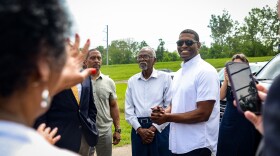-
Smith kicked off her first gospel concert tour in one of the country’s largest hotspots for toxic air last week: Louisiana’s chemical corridor.
-
Philanthropic and government investments in environmental justice are helping nonprofits push back against industrial development.
-
A new survey finds that Latino voters in the Mississippi River basin, including in Louisiana, care deeply about the river and are worried about pollution.
-
Environmental justice activists from opposite sides of the world came together on Friday in New Orleans to discuss their fights against the petrochemical industry. The event raised awareness about the 40th anniversary of the Bhopal disaster in India.
-
The new ruling bars Louisiana from considering whether to permit industrial facilities in communities already facing a disparate impact from pollution.
-
This summer’s “dead zone,” a low-oxygen area where the river empties into the sea, could span 5,827 square miles across the Gulf of Mexico. Louisiana has the power to call for change.
-
One year away from a federal deadline to reduce nutrient runoff into the Gulf of Mexico by 20%, increases in tile drainage, livestock and fertilizer use have made success unlikely.
-
In Louisiana, few people of color are getting high-paying jobs in the industry — or even low-paying ones
-
According to new research shared exclusively with Floodlight, in Louisiana’s majority Black communities in the area known as “Cancer Alley,” because of its high concentration of polluting industries, the majority of jobs go to white workers. Similar disparities occur in minority-dominant communities along Texas’ Gulf Coast, where the majority of workers are white.
-
The Environmental Protection Agency proposed tighter restrictions on air pollution from chemical plants on Thursday as part of the Biden administration’s pledge to fix long-standing environmental inequities in Louisiana, and across the country.

Play Live Radio
Next Up:
0:00
0:00
Available On Air Stations










